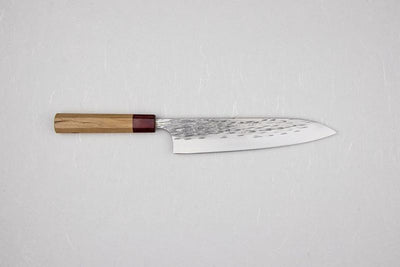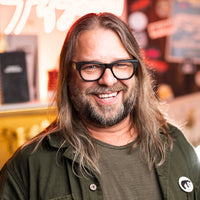
Blacksmith Profiles: Yu Kurosaki
This article is an excerpt from the book The Knifenerd guide to Japanese knives by Kevin Kent in which Kevin Kent, the Knifenerd, takes us behind the scenes with a personal look into the lives, skills and artistry of the blacksmiths who make the world’s finest knives.
“Let’s drink beer!” That’s how Yu Kurosaki usually greets me when I arrive at Takefu Knife Village. He likes to work hard and then have fun later. It reminds me of my past life in the kitchen.
Kurosaki-san started his blacksmithing career young. He dropped out of school at 16 to work in a car factory. Then, when he was only 17, he started working at Takefu Knife Village in Echizen. While he was there, he apprenticed under Hiroshi Kato and Katsushige Anryu before becoming the youngest Master Blacksmith in Knife Village.
In 2015, Kurosaki-san spread his wings and opened his own workshop. He built his factory and showroom on the other side of the Knife Village parking lot. Striking out on your own doesn’t mean you have to move across the country. The new workshop is clean, so clean. It hasn’t had the decades of coke dust, engine grease, and steel powder to make it a filthy, loveable mess yet. Give him time. The shop is also set up for speed. It is organized. Everything has a place and it’s all very logical. I like how he works.
Kurosaki-san is the poster boy for the future of blacksmithing in Japan. His knives are sexy, cool and unique. He’s successful and stylish, and he has customers around the world. This is why he graces the covers of so many knife magazines. All are displayed proudly in his sleek black showroom.
I recognize his work from a mile away, even if it’s one of his new experiments. His skills are mature and controlled, much like a blacksmith 10 to 15 years his senior. With contagious, boundless energy, he inspires the younger apprentices, often reminding them to learn from their mistakes, not fear them. All the young blacksmiths look up to him as an inspiration.Someone once told me that owning one of his early knives is like owning a Wayne Gretzky rookie card. I am lucky enough to have one of those early knives. I have a Masakage Shimo 240mm gyuto, hammered by Kurosaki-san. I have often said that if I had owned this knife when I was a chef, I might not have quit that career. I love this knife that much. I love the x-pattern Damascus steel he created for this line. I love the way this knife can get blazingly sharp, and I love how easy it is to keep sharp.
The last time we shared a beer, Kurosaki-san told me that he wants more people to use handmade knives. “Once people use one, they will know the difference immediately,” he says.
He wasn’t talking about customers outside of Japan, where he has rabid fans. He was talking about within Japan. He knows that in Japan, having a handmade knife in your kitchen at home is not common. In fact, many people in Echizen don’t even know their town has a world-famous blacksmith industry for kitchen knives. But they should.
And if you want to have a laugh after work, Kurosaki-san is your man. If you want to drink beer and eat great food, Kurosaki-san is your man. If you want beautiful knives that kick ass, Kurosaki-san is your man.
You can check out Yu Kurosaki knives here or the book The Knifenerd Guide to Japanese Knives.








